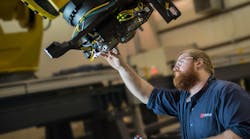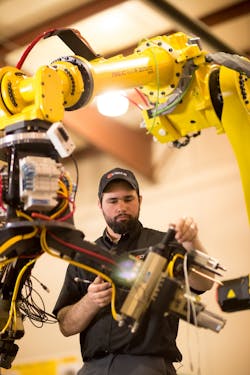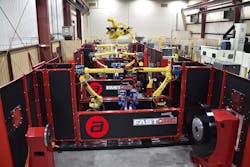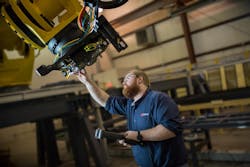By Mark Sumner
Acieta LLC
Council Bluffs IA
Automation offers benefits like improved quality, reduced costs, and access to real-time data from equipment. Of course, there’s also the solid return on investment (ROI) that minimizes implementation costs and maximizes equipment utilization.
As companies overseas begin to utilize robots and 2 million manufacturing jobs are predicted to go unfilled by 2020, automation also offers a competitive edge and acts as a solution to the skilled worker shortage.
For companies who’ve been on the fence, there couldn’t be a better time for manufacturers to take the next step toward robotic automation. In this post, we’ve outlined the future of automation and how robots can help businesses grow.
How Automation is Helping Businesses
As product demand grows, so does the need to remain competitive. However, as job openings officially exceeded the number of unemployed workers in June 2018 and labor costs have increased by 2.9%, remaining competitive has become a challenge. In addition, the average cost of hiring has risen to $7,600 per employee. It’s no surprise automation has become a helpful solution for slowed business growth and productivity.
It’s also empowering small businesses to keep their competitive edge without always having to hire. With the help of robots, companies are seeing higher production rates, increased productivity, more efficient use of materials, better product quality, improved safety, and reduced lead times. Employee safety is another added benefit of automation as it means fewer workers need to be put in hazardous environments on the floor.
Though automation isn’t set out to replace humans, automated systems are more likely to perform manufacturing processes with greater control and product consistency. This process control also helps companies become more efficient with materials resulting in less scrap.
The Future of Robotics
The U.S. is the fourth largest market for industrial robots in the world. If purchasing trends continue as they are now, it can be expected that North America as a whole will see robots sales grow annually by up to 10% by the end of 2019.
Increased output and productivity have been two of the biggest reasons for the move toward automation. Automation technology is helping to boost labor productivity nationwide as well as overall economic growth, which is still struggling to recover from the global financial crisis of 2008.
Automation technology is also on track to replace a large amount of the workforce by filling in the worker shortage gaps. Manufacturing has been hit particularly hard in light of the skilled labor shortage. Automation will have a positive effect for workers in manufacturing, as robots will replace dangerous and repetitive roles, allowing existing workers to move into more strategic positions at their companies.
Companies will see the return in boosted productivity, lowered labor costs, and improved efficiencies throughout their operations. Robots are an investment that pay for themselves — and often very quickly. If new robots are integrated and serviced properly, manufacturers can see an ROI in as little as two years.
Automation offers a competitive advantage for manufacturers in two ways: 1) Creating a higher quality work environment makes them more appealing to job seekers during a workforce shortage; and 2) Their ability to increase capacity and control quality enables American manufacturers to compete internationally. Considering the ROI of the robot, itself, the increased efficiencies on the production line, and the safety improvements that automation offers, it is no surprise that more and more American manufacturers are investing in automation as part of their strategic growth plans for 2019.
A Solution to Industry Challenges
Robotic automation is a realistic solution for manufacturers to combat the increasing workforce challenges and to maintain a competitive edge as demands for quality and quantity increase. As always, if automation is something your team has been considering, be sure to work with an automation integrator who understands the impact it will have on your business and can guide you through the process.












